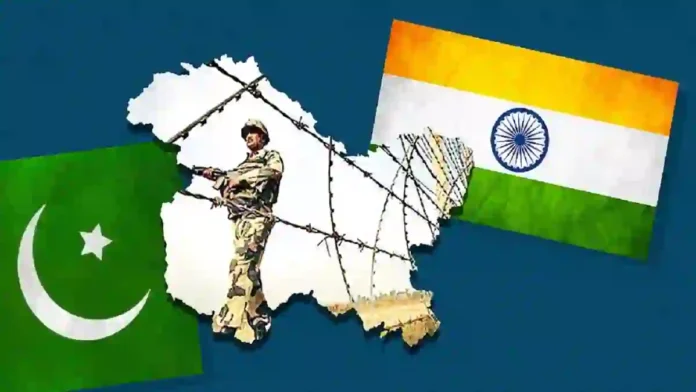Pakistan Prime Minister Shehbaz Sharif has underscored that normalisation of ties between India and Pakistan is impossible without resolving the Kashmir dispute, calling any expectation otherwise a “fool’s paradise.”
Speaking to overseas Pakistanis in London, he stated that both countries must learn to coexist as neighbours, but peace hinges on a Kashmir solution.
Read- IAF Aiming At Much More Than 42 Fighter Aircraft Squadrons, Says Top Official
Sharif emphasised that the billions spent on four wars between the two nations, including the ongoing conflict sparked by militant attacks in Kashmir, could have been better used for development and prosperity in Pakistan.
He accused India of choosing a combative stance rather than cooperative neighbourly behaviour and expressed hope for peace built on love and respect. Sharif also linked the Kashmir conflict to the larger regional unrest, referencing the Gaza war and the severe humanitarian crisis there.
The statement comes amid heightened tensions following the April 22, 2025, Pahalgam attack, where 26 civilians—mostly Hindu tourists—were killed by militants identified with Pakistan-backed groups. The attack significantly escalated hostilities, prompting India to suspend the Indus Waters Treaty, expel Pakistani diplomats, and close borders.
Pakistan denied involvement despite international calls for accountability. This crisis triggered intensified cross-border skirmishes and led to India’s Operation Sindoor on May 7-8, 2025, a precise missile strike campaign targeting terrorist camps linked to Jaish-e-Mohammed and Lashkar-e-Taiba.
Read- Pak Concerns: India’s Continuous At Sea Deterrence Nuclear Fortress In The Indian Ocean
Read- An Unexploded Pakistani Fatah-1 Series Rocket Shell Recovered From Dal Lake
Pakistan retaliated with drone and missile strikes on Indian military installations, marking the most serious India-Pakistan military crisis in decades. After a four-day conflict, both countries agreed to a ceasefire on May 10.
The May conflict saw India focus on terror infrastructure with no direct military base targeting, while Pakistan responded with attacks causing civilian casualties in India. India asserted it had incurred significant militant casualties during the strikes.
The ceasefire followed escalating drone battles and artillery exchanges, with both sides blaming the other for violations thereafter. India maintains the stance that terrorism and dialogue cannot proceed simultaneously without credible anti-terror measures from Pakistan.
Pakistan, meanwhile, has pushed for resolution talks based on equality and sought to restore diplomatic and treaty frameworks paused in the aftermath of the Pahalgam attack and ensuing conflict.
Sharif’s remarks reiterate Pakistan’s position that meaningful India-Pak ties depend on addressing Kashmir, while India insists on a terror-free environment as a precondition for dialogue.
The fallout includes sustained diplomatic stand-off, suspension of key bilateral treaties like the Indus Waters Treaty, and continued military alertness in the region.
The current India-Pakistan bilateral relationship remains stalled with heightened mistrust, where the Kashmir issue is central. Both governments face domestic pressure over terrorism, national security, and economic consequences of conflict.
Shehbaz Sharif’s call for peace highlights Pakistan’s view of Kashmir as essential to any rapprochement, reflecting ongoing regional geopolitical complexities amplified by incidents like the Pahalgam attack, Operation Sindoor, and the broader security scenario shaped by recent India-Pakistan confrontations.
Based On India Today Report
Agencies




